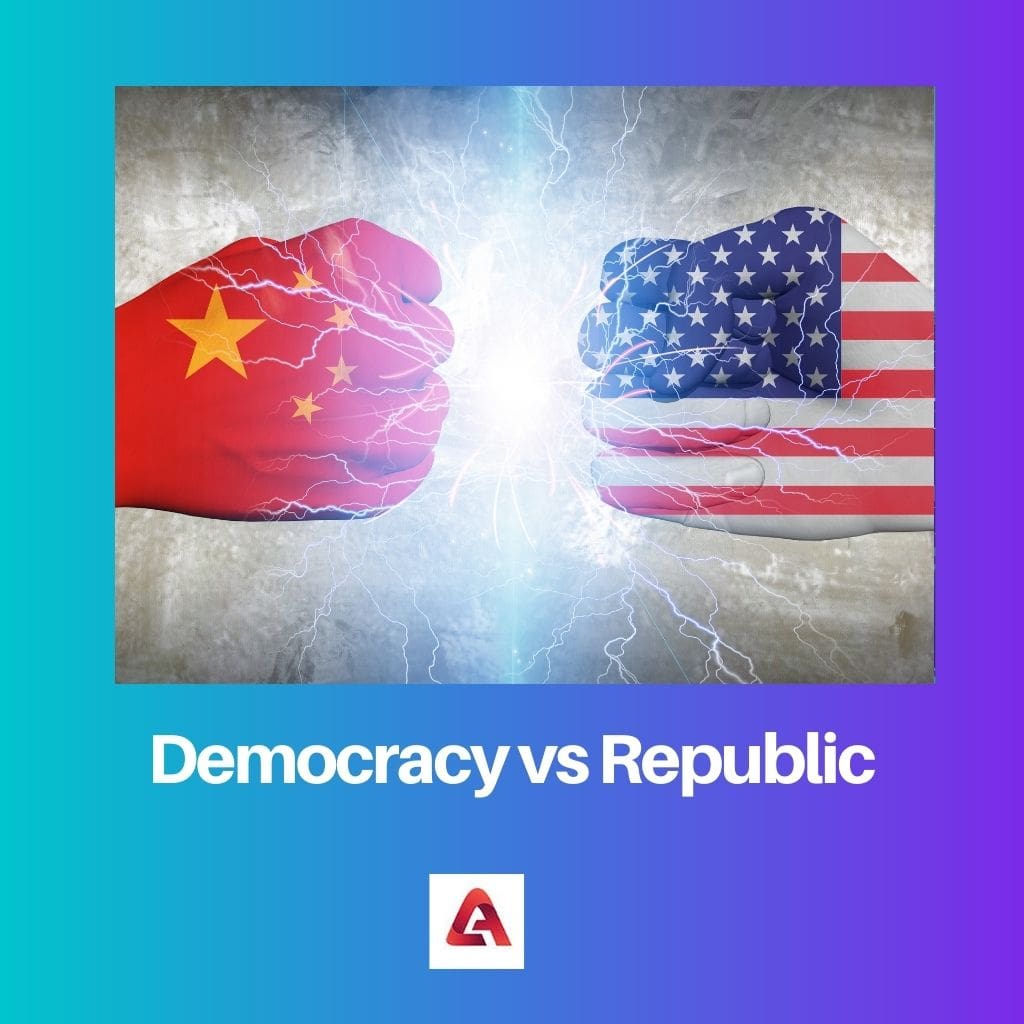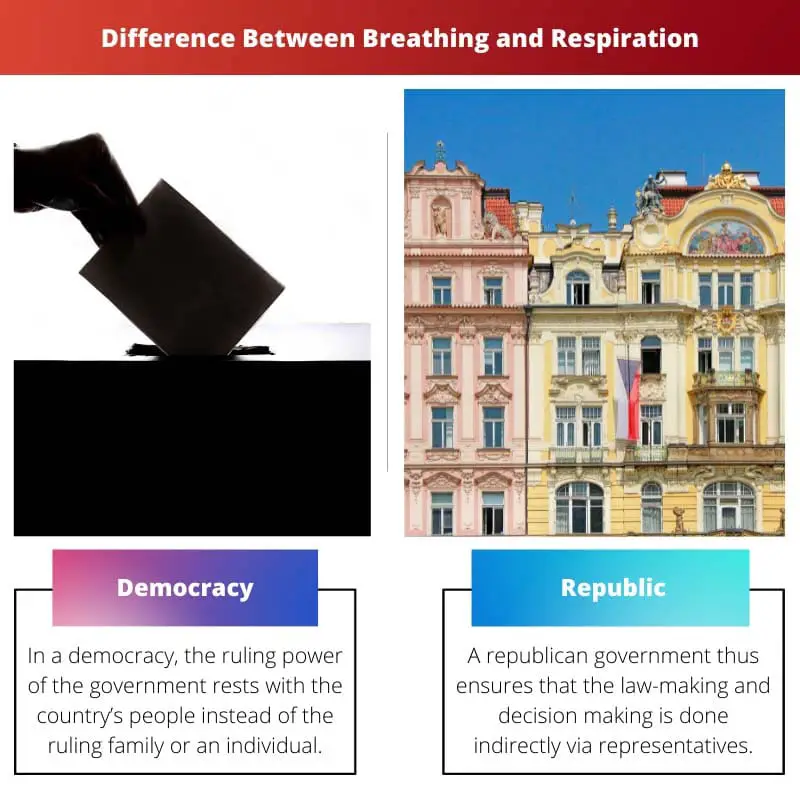Democracy is a form of government where power is vested in the hands of the people, who exercise it directly or through elected representatives. In contrast, a republic is a system where the country’s affairs are conducted by elected representatives and leaders, with power limited by a constitution or laws.
Key Takeaways
- Democracy and Republic are both forms of government in which the people hold power.
- In a democracy, decisions are made by the majority through direct or representative voting.
- In a republic, power is held by elected representatives who the people choose.
Democracy vs Republic
In a democracy, citizens vote through regular, accessible, and fair elections. The success of democracy depends on the active participation of citizens. A republic operates under a constitution, and the power is separated among different branches of government, like the executive, legislative and judicial. In a republic, the President is the head of state.

Comparison Table
| Feature | Democracy | Republic |
|---|---|---|
| Power Source | People hold ultimate power (directly or through elected representatives) | Power rests in a constitution and is exercised through elected representatives |
| Citizen Participation | Can be direct (voting on laws) or indirect (through elected representatives) | Primarily indirect (through elected representatives) |
| Focus | Will of the majority | Rule of law and protecting individual rights |
| Structure | Can be various forms, including direct democracy, representative democracy, or a combination | Typically a representative democracy with a constitution |
| Examples | Ancient Athens (direct democracy), Modern Switzerland (direct elements) | United States, India, France (representative republics) |
What is Democracy?
Democracy is a political system that prioritizes the participation of citizens in decision-making processes concerning the governance of a country. It is characterized by several key principles and features.
Principles of Democracy
- Popular Sovereignty: In a democratic system, the ultimate source of political authority lies with the people. Citizens have the right to participate in the political process, either directly or through elected representatives.
- Political Equality: Democracy upholds the principle that all citizens are equal under the law and have an equal opportunity to participate in the political process. Regardless of race, gender, ethnicity, or socioeconomic status, all individuals are entitled to equal rights and treatment.
- Majority Rule with Minority Rights: While majority rule is a fundamental aspect of democracy, it is essential to protect the rights and interests of minority groups. A democratic society safeguards individual liberties and ensures that minority viewpoints are respected and considered.
- Rule of Law: Democracy operates within the framework of a legal system that is fair, transparent, and accountable. All individuals, including government officials, are subject to the rule of law, which establishes clear rules and procedures for the conduct of political affairs.
Features of Democracy
- Free and Fair Elections: Elections are a cornerstone of democracy, providing citizens with the opportunity to choose their representatives and hold them accountable. In a democratic society, elections are conducted freely and fairly, with safeguards in place to prevent fraud and ensure the integrity of the electoral process.
- Civil Liberties and Human Rights: Democracy promotes the protection of civil liberties and human rights, including freedom of speech, assembly, religion, and the press. These rights are essential for fostering an open and inclusive society where individuals can express their opinions and participate in public discourse without fear of persecution or repression.
- Pluralism and Political Participation: Democracy thrives on the diversity of opinions and perspectives within society. It encourages active political participation from all segments of the population, including political parties, interest groups, and civil society organizations. Pluralism ensures that a wide range of viewpoints are represented in the decision-making process, enriching public debate and promoting inclusivity.
- Checks and Balances: To prevent the concentration of power and safeguard against abuses of authority, democratic systems typically incorporate mechanisms of checks and balances. These mechanisms distribute power among different branches of government—such as the executive, legislative, and judicial branches—and provide avenues for oversight and accountability.

What is Republic?
A republic is a form of government in which the country’s affairs are conducted by elected representatives and leaders chosen by the people. Unlike a monarchy or dictatorship, power in a republic is not inherited or centralized in a single individual or ruling family. Instead, it is vested in elected officials who govern according to laws and regulations established by a constitution or other governing documents.
Characteristics of a Republic
- Elected Leadership: In a republic, political leaders, including the head of state and other government officials, are elected by the citizens through a democratic process. These representatives are accountable to the electorate and are responsible for making decisions and enacting policies on behalf of the people.
- Rule of Law: Central to the concept of a republic is the principle of the rule of law. The government operates within a framework of legal norms and institutions that are established and enforced impartially. The rule of law ensures that no individual, including government officials, is above the law and that all citizens are treated equally under it.
- Constitutional Governance: Republics typically have written constitutions or charters that outline the structure of government, the rights and responsibilities of citizens, and the limitations on governmental power. These constitutions serve as the supreme law of the land and provide a framework for the operation of the government, as well as protections for individual liberties.
- Separation of Powers: A hallmark of many republics is the separation of powers among different branches of government, such as the executive, legislative, and judicial branches. This division of authority helps prevent the concentration of power in any one branch and provides checks and balances to ensure that no single branch becomes too dominant or abusive.
Types of Republics
- Presidential Republic: In a presidential republic, the head of state is typically a president who is elected separately from the legislature. The president serves as both the head of government and the head of state and exercises significant executive authority.
- Parliamentary Republic: In a parliamentary republic, the head of state is usually a ceremonial figure, such as a president or monarch, while the head of government is the prime minister. The prime minister is chosen from the majority party or coalition in the legislature and is responsible for leading the government and implementing its policies.
- Federal Republic: A federal republic is a political system in which power is divided between a central government and regional or state governments. This division of authority allows for greater autonomy and self-governance at the regional level while maintaining a unified national government.

Main Differences Between Democracy and Republic
- Nature of Governance:
- Democracy emphasizes direct or representative decision-making by the people.
- Republics, while often democratic in nature, prioritize the rule of law and constitutional governance, where elected representatives operate within the framework of established laws.
- Role of the Constitution:
- Democracies may or may not have a constitution, but they typically focus on majority rule and the protection of individual rights.
- Republics almost always have a constitution that establishes the framework for government operations, including the separation of powers and the protection of individual liberties.
- Leadership Structure:
- In a democracy, leadership can vary, but power often lies with elected officials, including presidents, prime ministers, or other representatives chosen through free and fair elections.
- In a republic, the leadership structure can also vary, but governance is generally conducted by elected officials who operate within the bounds of the constitution, which may include presidents, prime ministers, or ceremonial heads of state.
- Form of Government:
- Democracy can exist in various forms, including direct democracy, representative democracy, or a combination of both.
- Republics are a specific form of government where elected officials represent the interests of the citizens, often with a focus on the rule of law and individual rights.
- Emphasis on Popular Sovereignty vs. Rule of Law:
- Democracies prioritize the principle of popular sovereignty, where the authority of the government derives from the consent of the governed.
- Republics emphasize the rule of law, where government authority is constrained by legal principles and constitutional frameworks, ensuring that all individuals, including government officials, are subject to the law.
- Protection of Minority Rights:
- Democracies strive to protect minority rights through mechanisms such as constitutional provisions, checks and balances, and judicial review.
- Republics similarly aim to protect minority rights, often through constitutional guarantees and institutional safeguards against the abuse of power by the majority.

- https://hdsr.mitpress.mit.edu/pub/1g1cbvkv/release/2?readingCollection=03f9b00c
- https://media.gradebuddy.com/documents/3138616/68db8154-97ff-4540-8dd0-81400c449caf.pdf

The post presents a comprehensive overview of democracy and a republic, underscoring the core principles and key features of these political systems.
I completely agree with you, Isaac. This article delivers a well-rounded analysis of democracy and a republic.
This article thoroughly explains the key features and characteristics of a republic, equipping readers with a clear understanding of this form of government.
I share your perspective, Fharris. The delineation of a republic’s key features is articulated with precision and clarity in this post.
The distinction between democracy and a republic is clearly outlined here, making it easier to understand their differences and key features.
I couldn’t agree more. The post effectively illustrates the fundamental aspects of each form of government.
Absolutely, Callum. The detailed comparison table and the breakdown of core principles help in comprehending these political systems.
While this article offers a solid explanation of democracy and republic, it lacks depth on the challenges and intricacies that are involved in both forms of government.
I see your point, Wellis. It wouldn’t hurt to delve deeper into the potential pitfalls and complexities of democratic and republican systems.
The feature ‘What is Democracy?’ does an excellent job of outlining the core principles and key features of democratic governance. A well-structured and articulate explanation.
I completely agree with your assessment, Kyle. This section accurately captures the essence of democracy and its essential components.
While the article effectively highlights the fundamentals of a republic, it would be interesting to explore further the historical context and evolution of this form of government.
I see where you’re coming from, Brandon. An examination of the historical roots of a republic could add valuable context to the discussion.
This post does a great job of explaining the differences and key features of both democracy and a republic. It’s informative and well-organized. The comparison table really helps to clarify the distinctions.
I totally agree with you, Benjamin. The post provides a clear and concise overview of these forms of government.
The distinctions between democracy and a republic are delineated with clarity and depth in this post, enriching the readers’ comprehension of these political systems.
I couldn’t agree more. The post offers a comprehensive overview of the distinguishing features of these political systems.
Absolutely, Robinson. The detailed analysis serves as an enlightening resource for understanding the intricacies of democratic and republican governance.
This article seems to provide a comprehensive overview of democracy and a republic, shedding light on their distinguishing characteristics.
The article effectively captures the defining elements and distinctions between democracy and a republic, providing an informative and insightful read.